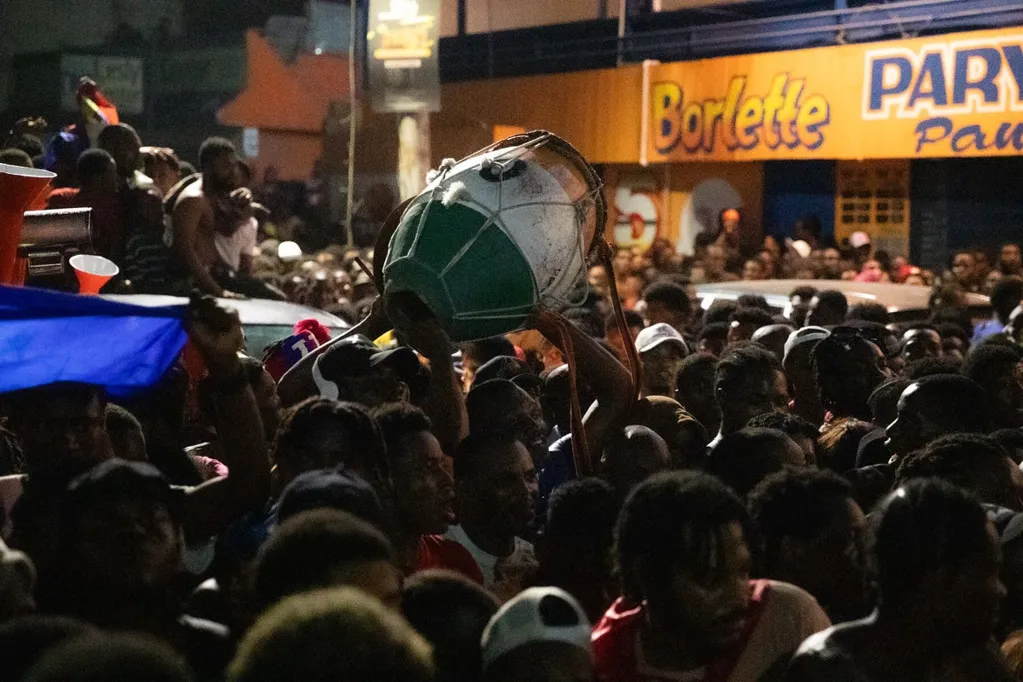Haiti qualified this week to compete in the men's World Cup for the first time since 1974 but travel bans imposed by the U.S. government mean many fans will not be able to travel from the Caribbean country to attend their nation's games in the United States next summer.
In June, U.S. President Donald Trump signed a travel ban against 12 countries, a step he described as being essential to "protect the national security and national interest of the United States and its people." The banned list included forbidding the entry into the U.S. of nationals of Haiti as both immigrants and non-immigrants.
The executive order, announced on June 4, was titled: "RESTRICTING THE ENTRY OF FOREIGN NATIONALS TO PROTECT THE UNITED STATES FROM FOREIGN TERRORISTS AND OTHER NATIONAL SECURITY AND PUBLIC SAFETY THREATS."
The document said that Haiti had been targeted because a report by the Department of Homeland Security for Fiscal Year 2023 had stated that Haitians who entered the U.S. on a B-1 or B-2 visa (for business or pleasure) had an overstay rate of 31.38 per cent while the overstay rate for nonimmigrant students and exchange visitors was 25.05 per cent.
The executive order also claimed: "Hundreds of thousands of illegal Haitian aliens flooded into the United States during the Biden Administration. This influx harms American communities by creating acute risks of increased overstay rates, establishment of criminal networks, and other national security threats. As is widely known, Haiti lacks a central authority with sufficient availability and dissemination of law enforcement information necessary to ensure its nationals do not undermine the national security of the United States."
Haiti has been embroiled in political crises ever since its previously elected president Jovenel Moise was assassinated in 2021. The United Nations have said that gang control 90 per cent of the territory in the Haitian capital Port-au-Prince.
The dangerous conditions in Haiti have meant the national team played its home games outside of the country during its Concacaf qualification for the tournament, with Tuesday night's 2-0 victory over Nicaragua played in Curacao.
Haiti's team should have no issues in competing at the World Cup. This is because the order contained an exemption for "any athlete or member of an athletic team, including coaches, persons performing a necessary support role, and immediate relatives, traveling for the World Cup, Olympics, or other major sporting event as determined by the Secretary of State."
However, there are no such exemptions for supporters.
On Wednesday, The Athletic approached both the Haitian embassy in Washington D.C., FIFA and the U.S. State Department to ask whether any conversations were taking place in order to assist Haitian fans who wish to visit to attend the tournament. At the time of publication, no parties had not responded.
In 2017, one year before the U.S. joint bid won the right to host the 2026 competition, FIFA President Gianni Infantino told reporters: "It's obvious when it comes to FIFA competitions, any team, including the supporters and officials of that team, who qualify for a World Cup need to have access to the country, otherwise there is no World Cup."
Additionally, on May 2, 2018, Trump wrote a letter to Infantino and said he was confident that "all eligible athletes, officials and fans from all countries around the world would be able to enter the United States without discrimination."
Earlier this year, Infantino said: "America will welcome the world. Everyone who wants to come here to enjoy, to have fun and to celebrate the game will be able to do that."
The Haitian team may also be supported by the substantial Haitian population within the United States. The Census Bureau's 2024 Current Population Survey (CPS) estimated that there were around 852,000 Haitian immigrants in the U.S., according to the Center for Immigration Studies, with over 50 per cent in Florida.
Haitians in the U.S. became the subject of public discussion during last year's Presidential election campaign when President Trump made the baseless claim that Haitian immigrants in Springfield, Ohio, had taken and eaten their neighbors' cats and dogs.
Iran is the only other nation who have qualified for the World Cup whose nationals remain on a banned list for travel. Trump's executive order described Iran as a state sponsor of terrorism and accused its government of "regularly failing to cooperate with the United States Government in identifying security risks."
